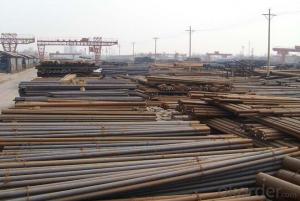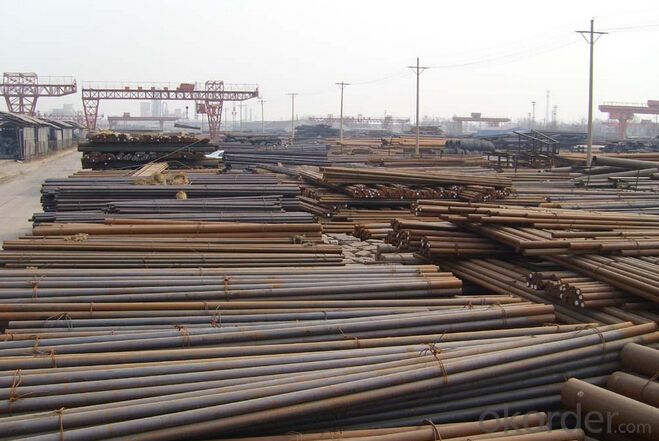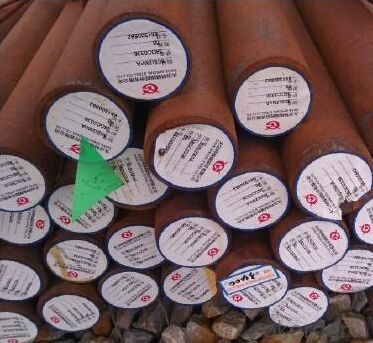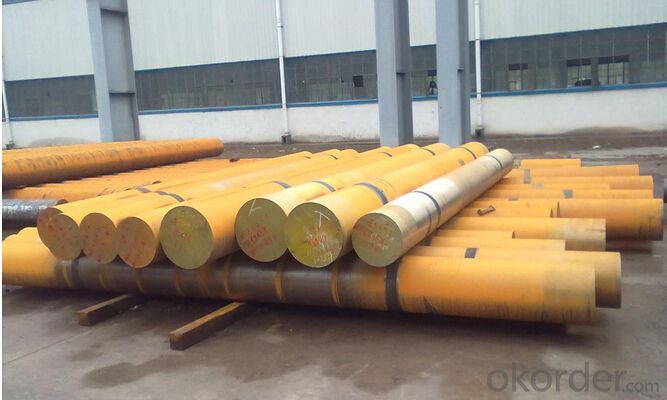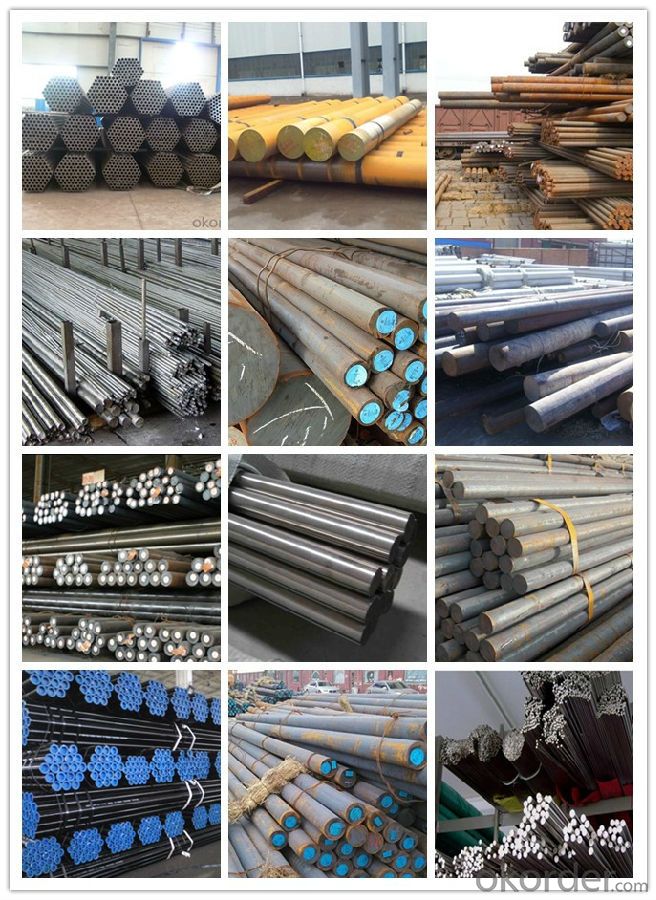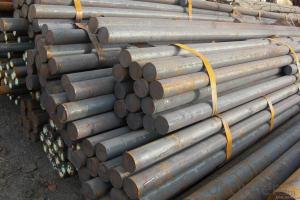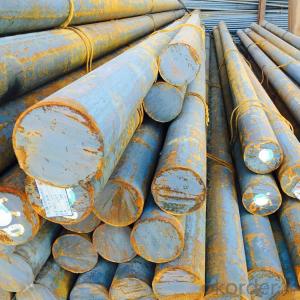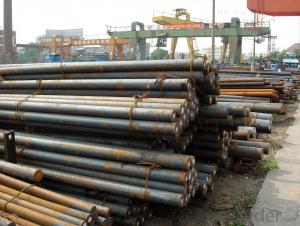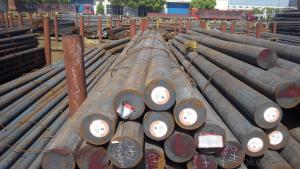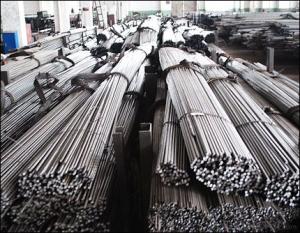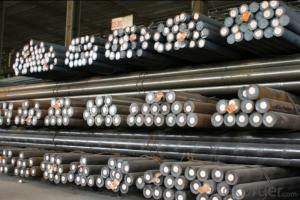Special Steel 1045 / S45C / C45 Carbon Tool Steel
- Loading Port:
- China main port
- Payment Terms:
- TT OR LC
- Min Order Qty:
- 30 m.t.
- Supply Capability:
- 10000 m.t./month
OKorder Service Pledge
OKorder Financial Service
You Might Also Like
Specification
Product information
carbon steel AISI1045\DIN1.1191\S45C\GB45
1.Annealed to HBS<220; hot rolled,black.
Used for making die-board,general
2.Chemical compostion:
C | Si | Cr | Mn | Ni | P | S | Cu |
0.42-0.55 | 0.17-0.35 | ≤0.022 | 0.50-0.75 | ≤0.012 | ≤0.018 | ≤0.01 | ≤0.017 |
3.Round sizes:
Dia 30-350mm Length 2500-4000mm or on your request.
4.Factory condition:
Annealed to HBS<220;hot rolled,black.
5.Application:
Used for making die-board,general machinery parts.
Product show
Workshop show
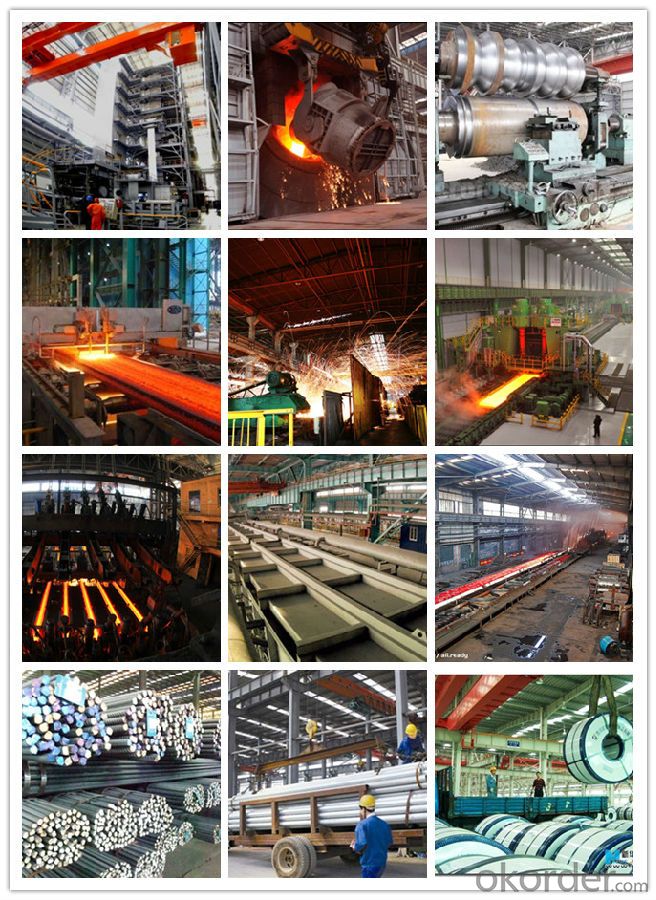
Shipping
1. FedEx/DHL/UPS/TNT for samples, Door-to-Door;
2. By Air or by Sea for batch goods, for FCL; Airport/ Port receiving;
3. Customers specifying freight forwarders or negotiable shipping methods!
Delivery Time: 3-7 days for samples; 5-25 days for batch goods.
Payment Terms
1.Payment: T/T, L/C, Western Union, MoneyGram,PayPal; 30% deposits; 70% balance before delivery.
2.MOQ: 1pcs
3.Warranty : 3 years
4.Package Informations: 1) EXPORT, In 20 feet (GW 25 ton) or 40 feet Container (GW 25 ton)
2)as customer's requirement
Why choose us?
(1) The leading exporter in China special steel industry.
(2) Large stocks for various sizes, fast delivery date.
(3) Good business relationship with China famous factories.
(4) More than 7 years steel exporting experience.
(5) Good after-sales service guarantee.
- Q: What are the main alloying elements in special steel?
- The specific type or grade of special steel can determine the main alloying elements present. Chromium, nickel, molybdenum, vanadium, tungsten, and cobalt are common alloying elements in special steel. These elements are incorporated into the steel to improve its properties, including corrosion resistance, strength, hardness, and heat resistance. Each alloying element has a distinct impact on the steel, enabling the development of specialized steel grades for diverse applications in industries like aerospace, automotive, oil and gas, and construction.
- Q: What are the different chemical resistance grades of special steel?
- Special steels, commonly known as stainless steels, possess exceptional resistance to corrosion and chemical attack. They are a category of alloys that contain a substantial amount of chromium, which forms a protective oxide layer on the surface, preventing further corrosion. The chemical resistance of special steel may vary depending on the particular grade or alloy composition. Below are some of the typical chemical resistance grades of special steel: 1. Austenitic Stainless Steel: This is the most prevalent stainless steel type and exhibits excellent resistance to a broad range of chemicals, including organic acids, alkalis, and salts. The most commonly used grade in this category is 304 stainless steel. 2. Ferritic Stainless Steel: Ferritic stainless steels have lower corrosion resistance compared to austenitic grades but still offer good resistance to many chemicals. They are particularly resistant to nitric acid and some organic acids. Grade 430 stainless steel serves as a common example of ferritic stainless steel. 3. Martensitic Stainless Steel: Martensitic stainless steels are recognized for their high strength and hardness. Although they have lower corrosion resistance compared to austenitic and ferritic grades, they can still exhibit good resistance to certain chemicals, especially in mildly corrosive environments. 4. Duplex Stainless Steel: This type of stainless steel combines the properties of both austenitic and ferritic grades, resulting in enhanced strength and improved resistance to stress corrosion cracking. Duplex stainless steels offer excellent resistance to a wide range of chemicals, including organic acids, chloride-containing solutions, and saltwater. 5. Precipitation-Hardening Stainless Steel: These steels can undergo heat treatment to achieve high strength and corrosion resistance. They typically exhibit resistance to a broad range of chemicals, including organic acids, alkalis, and some organic solvents. It is crucial to note that the chemical resistance of any steel grade can also be affected by factors such as temperature, chemical concentration, and the presence of other corrosive agents. Therefore, it is advisable to consult the manufacturer's specifications or seek expert advice when selecting a special steel grade for specific chemical resistance requirements.
- Q: What are the main applications of special steel in the power generation equipment?
- Special steel is widely used in power generation equipment for various applications. Some of the main applications include the construction of gas and steam turbines, generator rotors, boiler tubes, and pressure vessels. Special steel's high strength, corrosion resistance, and exceptional heat resistance make it ideal for these demanding environments, ensuring the reliability and efficiency of power generation equipment.
- Q: Can special steel be used in aerospace turbine components?
- Yes, special steel can be used in aerospace turbine components. Special steel, also known as high-performance alloy steel, possesses excellent mechanical properties such as high strength, hardness, and temperature resistance. These properties make it suitable for use in aerospace turbine components, which are subjected to extreme conditions such as high temperatures, pressures, and stress. Aerospace turbine components, including blades, vanes, and disks, are critical parts of jet engines that require materials capable of withstanding the harsh operating conditions. Special steel alloys, such as nickel-based superalloys, are commonly used in these applications due to their ability to maintain their strength and integrity at elevated temperatures. Additionally, the high strength-to-weight ratio of special steel allows for the production of lightweight yet durable turbine components, contributing to the overall efficiency and performance of the aerospace systems. Moreover, special steel alloys can also exhibit excellent resistance to corrosion, oxidation, and fatigue, which are crucial factors in the long-term reliability and safety of aerospace turbine components. These materials undergo rigorous testing and certification processes to ensure they meet the stringent standards and requirements set by the aviation industry. In conclusion, special steel is indeed a suitable material for aerospace turbine components due to its exceptional mechanical properties, high temperature resistance, and ability to withstand extreme conditions. It plays a vital role in ensuring the reliability, efficiency, and safety of turbine systems used in aerospace applications.
- Q: What are the different methods for surface hardening special steel?
- There are several methods for surface hardening special steel, including carburizing, nitriding, induction hardening, flame hardening, and laser hardening. Carburizing involves introducing carbon into the surface of the steel through heating in a carbon-rich environment. Nitriding involves diffusing nitrogen into the surface of the steel to create a hard nitride layer. Induction hardening uses electromagnetic induction to heat the surface of the steel and then rapidly quench it to increase hardness. Flame hardening involves heating the surface of the steel with a flame and then quenching it to harden the surface. Laser hardening uses a high-intensity laser beam to heat the surface of the steel and then quench it, resulting in a hardened surface.
- Q: What are the different certifications available for special steel?
- Depending on the specific industry and application, there are multiple certifications available for special steel. Some of the well-known certifications are as follows: 1. ISO 9001: This certification ensures that the special steel manufacturer has implemented and maintained a quality management system that adheres to international standards. It signifies the company's dedication to consistently delivering products that meet customer requirements. 2. ISO 14001: This certification focuses on environmental management and guarantees that the special steel manufacturer has adopted eco-friendly practices in their operations. It showcases the company's commitment to reducing their impact on the environment. 3. Certifications by ASME (American Society of Mechanical Engineers): ASME provides several certifications for special steel used in pressure vessels, boilers, and other applications. These certifications ensure that the special steel meets industry-specific quality and safety standards. 4. PED (Pressure Equipment Directive): This certification is mandatory for special steel used in pressure equipment within the European Union. It guarantees that the steel meets specific safety and quality requirements. 5. Certifications by NACE (National Association of Corrosion Engineers): NACE offers certifications for special steel used in corrosive environments. These certifications ensure that the steel possesses the necessary resistance against corrosion and can endure harsh conditions. 6. Certifications by API (American Petroleum Institute): API offers certifications for special steel used in the oil and gas industry. These certifications ensure that the steel meets various quality and performance standards required for different applications in the industry. 7. Certifications by ASTM (American Society for Testing and Materials): ASTM provides various certifications for special steel based on specific standards and specifications. These certifications guarantee that the steel satisfies the required mechanical properties, chemical composition, and other criteria. Manufacturers, suppliers, and end-users should take these certifications into consideration when selecting special steel for their specific applications. These certifications provide confidence and assurance regarding the quality, safety, and performance of the special steel products.
- Q: What are the main advantages of using special steel in the defense industry?
- The main advantages of using special steel in the defense industry are its exceptional strength, durability, and resistance to extreme conditions. Special steel can withstand high impact and provide superior protection against ballistic threats, making it ideal for armored vehicles, tanks, and military aircraft. Additionally, its corrosion resistance ensures longevity and reduces maintenance requirements. Special steel also offers versatility in terms of design and customization, allowing for the development of advanced weaponry and equipment.
- Q: How does special steel contribute to reducing product failures in high-stress applications?
- Special steel contributes to reducing product failures in high-stress applications by offering enhanced strength, durability, and resistance to wear and corrosion. Its unique composition and manufacturing processes ensure that it can withstand extreme conditions, such as high temperatures, pressure, and mechanical forces. Special steel also allows for precise engineering and design, enabling the production of components that can handle demanding environments without yielding or breaking. By utilizing special steel in high-stress applications, manufacturers can significantly decrease the likelihood of product failures, ensuring safer and more reliable performance.
- Q: What are the main characteristics of magnetic steel forgings?
- The main characteristics of magnetic steel forgings are high strength, excellent wear resistance, and good magnetic properties. These forgings are known for their durability and ability to withstand extreme conditions. They also have good machinability and can be easily formed into various shapes.
- Q: How does special steel contribute to improved product aesthetics?
- Special steel contributes to improved product aesthetics in several ways. Firstly, special steel can be manufactured with a higher level of precision and consistency compared to regular steel. This allows for the creation of products with smoother surfaces, sharper edges, and more intricate designs. As a result, products made from special steel often have a more visually appealing appearance. Additionally, special steel can be treated or coated to enhance its visual appeal. For example, it can be polished to create a reflective surface, giving the product a high-end and luxurious look. Special steel can also be coated with different colors or finishes, such as chrome or black oxide, to match specific design preferences and create a more visually striking appearance. Furthermore, special steel can be shaped and formed in unique ways due to its superior strength and flexibility. This allows designers to create products with more complex and innovative shapes, resulting in a distinct and eye-catching aesthetic. The ability to mold special steel into various forms also opens up possibilities for creating intricate patterns, textures, and embossed designs on the product's surface. Lastly, special steel offers excellent corrosion resistance and durability, which helps maintain the product's appearance over time. It prevents rust, staining, and other forms of deterioration that can negatively impact the visual appeal of a product. This long-lasting aesthetic quality is especially important for products that are regularly exposed to harsh environments or require frequent handling. In summary, special steel contributes to improved product aesthetics through its precision manufacturing, customizable surface treatments, unique shaping capabilities, and long-lasting visual appeal. These qualities allow for the creation of visually appealing products that stand out in terms of design, finish, and overall appeal.
Send your message to us
Special Steel 1045 / S45C / C45 Carbon Tool Steel
- Loading Port:
- China main port
- Payment Terms:
- TT OR LC
- Min Order Qty:
- 30 m.t.
- Supply Capability:
- 10000 m.t./month
OKorder Service Pledge
OKorder Financial Service
Similar products
Hot products
Hot Searches
Related keywords
